Peter MALONE
Saturday, 18 September 2021 19:52
Pirogue, La
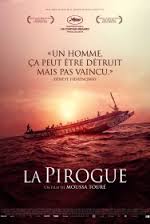
LA PIROGUE
Senegal, 2012, 87 minutes, Colour
Directed by Moussa Toure.
La Pirogue is a film from Western Africa, from Senegal. It is an earnest film, reflecting ways of life in the country as well as poverty, difficulties and the desire to migrate to Europe. It is a story that is applicable to many countries of northern Africa.
It is also topical for other areas of the world, including Asia and the Pacific. It highlights the dangers of ordinary people setting out on unreliable boats, with unreliable crew, victims of paying up to people smugglers, unscrupulous in packing the boats, getting the money.
The film opens colourfully, with crowds enjoying two famous wrestlers, the preparations for a bout and the contest. It then moves to more serious themes, the man who could captain the boat, his relationship with his wife and family, the dangers. He has friends who are in contact with the people smugglers. He finally decides to go, finding that there are more refugees from Guinea who cannot speak the local language.
While at sea, some passengers become sick, others die. There is a man with mental problems who has his own chicken and who has two have his mouth taped so that people can get sleep. We also see some of the ambitions of the refugees, a musician wanting to team up with a band, others finding relatives in Andalusia. Spain is the desired target for their voyage. At one time, becalmed, they encounter another ship with some of the passengers swimming to them, whom they take on board, but move away very quickly.
It is a diminished group who finally arrive in Spain, go through the procedures on arrival – but it is left to the audiences’ imagination as to what happens to the refugees.
1. Topical film? Refugees? Sea voyages? Hopes, frustrations, disasters?
2. The Senegalese setting? The way of life, the city, homes, jobs, fishing, boats? An authentic feel?
3. The opening, the ceremonies, the crowds, the two wrestlers, the wrestling match?
4. Ordinary people, the men, friendships, the boats? Families? No good fishing?
5. The people smugglers, their power, influences, deals? Rounding up refugees, hiding them on the boat?
6. The decision to go, the pressure on the captain? Farewell to his wife? His reassurances?
7. The extra refugees, not knowing the language? Communication? The later encounter with the sinking boat? Taking only a few refugees who swam towards them? The others?
8. Conditions on the boat, food and water, the sun, becalmed? The engine, need for the wind? Repairs?
9. The man with mental problems, gagging him? His hen? The later killing and eating it?
10. Illness, deaths, bodies overboard?
11. The hopes of Spain, the calculations about the trip, the coastguard and taking the refugees on board?
12. Spain, the interrogations, the possibilities for the refugees, finding family, going to France, playing in bands, going to farms in the south?
13. Realistic look at the plight of refugees from Africa to Europe?
Published in Movie Reviews
Published in
Movie Reviews
Tagged under
Saturday, 18 September 2021 19:52
Storytelling
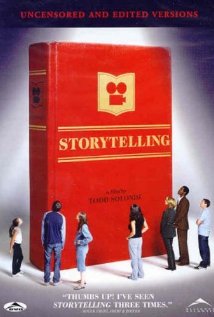
STORYTELLING
US, 2000, 2001, 87 minutes, Colour.
Fiction: Selma Blair, Leo Fitzpatrick, Robert Wisdom.
Non-fiction: Paul Giamatti, Mark Webber, John Goodman, Julie Hagerty, Steve Railsback, Xander Berkely, Noah Fleiss, Jonathan Osser, Lupe Ontiveros, Frankar Potente, Conan O' Brien.
Directed by Todd Solandz.
Writer- director Todd Solandz made quite an impact with his 1995 feature, Welcome to the Dollhouse. After four years, he produced the controversial film, Happiness (making a sequel, but employing quite a different cast, Life During Wartime).
Storytelling came two years after Happiness. While extra scenes, possibly for a third story, were filmed, they were dropped from the final product which encompasses two stories: Fiction and Non-fiction.
There are psychological and moral twists and turns in the Fiction story, focusing on Selma Blair as an aspiring writer, her disabled boyfriend, Leo Fitzpatrick, and her quite arrogant English professor, Robert Wisdom. The boyfriend is an aspiring writer but not very successful. The girl attends class, is criticised, sometime superciliously by the other students, has a sexual encounter, violence and rape, with the professor and writes this up as a story which the other students dismiss as exaggerated imagination.
A teenager, Mark Weber, is the centre of the second story, Non-fiction. He is quite a slacker, contrasting strongly with his very young brother who is extremely intelligent (but who is shown to be arrogant in his dealings with the Hispanic maid). The parents are something of caricature as played by John Goodman Julie Haggerty. When the boy is approached by a would-be filmmaker, Paul Giamatti, to participate in a documentary, he readily agrees, the parents checking out with the director and making their demands but allowing filming at home. The boy is full of himself, imagining that he might be a talkshow host and boasting.
When footage is shown to a group of students at College, there is a great deal of laughter, which sends the boy into an emotional spin. One almost feels very sorry for him, although he is dense. There is satire all around.
Todd Solandz is an idiosyncratic director, with a seeming pessimistic outlook on life, but able to communicate characters who are very strange, need some psychological help – which means that his body of work is certainly challenging and arresting.
1. The work of the director, his career, his outlook, pessimism, sardonic, perspectives on human nature, flaws and failings, on the family, suburbs, on pretension?
2. The New Jersey settings, college, classrooms, apartments, cafes? The school, homes, the film world? The musical score?
3. The device of having two films? The title of storytelling? How much truth, imagination, accuracy and observation?
4. Fiction: Vi, relationships, sexuality, cerebral, emotional? With Marcus, her friendship, his having cerebral palsy, way of speaking? Mark and his disability, sexual relationships, manner of speaking here, his mouth disfigured, dependence on Vi? In the writing class, their stories? Mark reading his story, about himself, the reactions, self-pity, cliches, the students and their support, the girl with her negative criticisms, but saying that that was just her? The Professor, his novels and awards? His solemnity, carving up the story? The aftermath, Vi and her feelings, Marcus, hurt, admitting the truth about the limitations of his story? His taunting Vi that she wanted to sleep with the Professor? Vi and her roommate, the discussions, decisions as to what she should do? Going to the bar, dressing in the sexy way, seeing the Professor, approaching him, talking, the flattering, his come on, going to the room, seeing the photos of the girl, the sexual behaviour, stripping, voyeur, the sexual experience, her humiliation? The classroom, reading the story, the various reactions, the students thinking it was unreal, fake, anti-women? The Professor and his praising the story, as an improvement, a little truth? Vi and her being left, the audience being left, with an open ending?
5. Non-fiction: Scooby and his interview, inarticulate, wanting to host a talk-show? The career advisor and his bewilderment?
6. Toby and his ambitions, flatmate, wanting to make the film, approaching people to support, the discussion with the school principal, encountering Scooby, making his decision?
7. Scooby and his family, his staying in his room, introverted, off-hand, limited in his outlook? Brady, taunting his brother, sports, the accident, his being in hospital in a coma? Mikey, very young, precocious, his talk at the table? Mark and Fern, their marriage, Mark’s dominance, Fern and her explaining things away, making excuses? Mark and his strong opinions, sending the boys from the table? Brady suggesting that Scooby was gay, Mark’s reaction? The interview with Toby, the mercenary touch?
8. The scenes of making the film, Toby and his cameraman, the setups, the reality filming, going to the editor, her comments, her critique of Toby’s looking down on the family, his defence?
9. The family, the suburbs, the Jewish background, the references, the Holocaust, migrants to the United States, the different generations? Business? Scooby in his room, silent, the gay friend, his allowing him to touch him? The visits to Brady in hospital?
10. Mikey, his comments, his adult manner, discussing things with Consuelo, her work, family, her son in prison, murder and rape, capital punishment? Her work around the house, the weeping? Mikey spilling things on the floor, unable to fix them himself, seeking Consuelo, the discussions with her? His complaining to his father about her?
11. The hypnotism, Mikey wanting to do it, his father submitting, Mikey filling his father with ideas, favouring him, saying that Consuelo was lazy wanting her fired? Mark coming to, talking favourably to Mikey, the discussions at home, dismissing Consuelo?
12. Scooby wanting to see the film, his interviews for Toby, expressing himself, his imagining that he could be a talk-host, the fantasy and his meeting the real Conan O’ Brien, being interviewed by him, his hopes of succeeding him? Going to the school, the students watching the film, the loud laughter, Scooby and the humiliation?
13. Consuelo, being dismissed, coming to the house, connecting the pipes, gassing the family?
14. Scooby’s return, the scene of the accident, his looking on in bewilderment? His future?
15. The two films as examples of the director’s perspective, a critical view of life and people, somewhat suddenly and sour?
Published in Movie Reviews
Published in
Movie Reviews
Tagged under
Saturday, 18 September 2021 19:52
We are the Best/ Vi ar bast
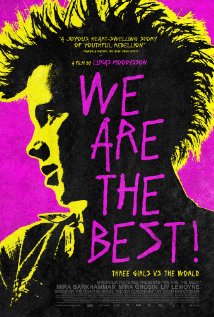
WE ARE THE BEST/ VI AR BAST
Sweden, 2013, 102 minutes, Colour.
Mira, Barkhanmmar, Mira Grosin, Liv Le Moyne.
Directed by Lucas Moodyson.
1. Sweden in the 1980s, the behaviour of adults, parents, their lives, problems, the touch of mockery in their presentation? The contrast with the girls, their place in their families? Close to parents, but difficulties?
2. The memories of punk rock, the range of songs, the performances?
3. This film as a girl’s story, their age, interests, styles, appearance, music?
4. The initial focus on Bobo, her mother’s 40th birthday party, relationship with her mother, with Lasse, her decision to leave, going to bed, listening to the music, phoning Klara, Klara’s parents and their shouting? School, friendships? Going to the Centre, the boys’ band rehearsing, the girls putting in their name to the space, the authorities having to oust the boys, their being upset, Bobo and Klara, the instruments, starting to play, getting into the rhythms, success? Bobo and her tenderness towards her mother?
5. The girls, their look, androgynous? The punk look and the hair? The two different personalities? Complementary? The encounter with Hedvig her family? Her being taller, quieter? Her joining in the group? Discussions, playing of instruments? The bonding?
6. The boy band, the girls seeing the write-up, the phone call, the decision to visit, only two boys there, Klara and her interest in Elis, Bobo and her being quiet? The two boys and their discussions about the girls? On the roof, Bobo upset, walking dangerously? Bobo later ringing Elis, coming over with the record, the visit as a betrayal of Klara? Klara finding out, upset, the fight, Hedwig moderating? In the subway, becoming friends again?
7. The Christmas celebration, Bobo and her wanting to contact Elis, his not being at home? The break?
8. Going to the performance in the other town, the audience, the girls playing, the booing, the attack, the fight? On the bus going home?
9. The two men at the Centre, the rules, the helping the girls, with the performance at the other town, on the bus coming home?
10. The future for these two girls? The final credits? (And the irony of Klara’s father and his playing the instrument on the toilet?).
Published in Movie Reviews
Published in
Movie Reviews
Tagged under
Saturday, 18 September 2021 19:52
Fell
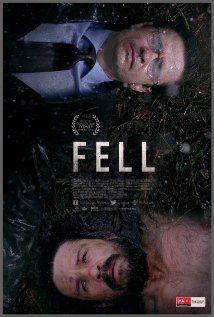
FELL
Australia, 2014, 91 minutes, Colour.
Matt Nabel, Daniel Henshaw, Jacqueline Mc Kenzie, Adele Petrovic, John Brumpton, Emily Thomson, Syd Brisbane, Daniel P.Jones.
Directed by Casimir Burgess.
Fell is an unusual Australian film, the directing feature film debut of Kasimir Burgess.
On the one hand, it is a revenge film, Matt Nable Queen playing a father out in the countryside his daughter is killed by a hit-run truck driver, played by Daniel Henshall (the sinister central character in Snow town).
The father leaves the city – of which there are some flashbacks – and stays as a recluse in the bush, getting a job as a timber man. When the driver is released from prison, the two men work together, in some kind of rapport, with the driver regretting his actions.
On the other hand, this is a film about nature, beautifully photographed, the look and sounds of the Australian bush – as well as issues about cutting down of trees and the timber industry versus the environment.
Which makes for a rather contemptuous of experience rather than any adrenaline action film – which might make it a difficult sell for commercial audiences.
1. An Australian film? Drama? Meditation? Symbols?
2. The significance of the visual style, the beauty of the forests, the harshness of the logging work, the quiet scenes with father’s daughters, the rough-and-tumble scenes of the workers? The range of pace? Musical score?
3. The nature of the shots, long takes, giving audiences time to reflect, the editing, audience response, the importance of patience?
4. The narrative, explicit, implicit, suggested, evoked, and the more direct storytelling?
5. The title, the falling of the leaves, Thomas’s explanation for his daughter, leaves falling so that the tree could live? Trees being chopped down and falling? Sin and the fall, original sin, vengeance? The crashing down of the trees? The skills for felling the trees? The final image of Thomas on the tree?
6. Thomas and his daughter, quality time with her, explanations of the leaves, the quiet joy together? The strong bond? Establishing this for the impact of her death? For seeing Luke and his daughter? Thomas’s final decision? The daughter, the hit-and-run, the logging truck, commerce chasing it, the little girl on the ground, the blood, the death? Her father’s grief?
7. Thomas and his ordinary life, in Melbourne, tie and glasses, the long sequence of his driving the car through the various suburbs with their backgrounds? Out of the town? Living as an exile? The hut in the forest?
8. Its later being established that five years had passed? The glimpses of Luke in prison? His recording the story for his daughter? Getting out, the sexual encounter? Going to his mother, trying to establish a relationship with his daughter, taking her away, living with him while he worked? The food, her grandmother’s regime, being anxious, her wanting to go home? Luke and his going to work, the loggers, shunning him? His personality, the various jobs, interactions with the men, the drinking, the fighting? The different jobs? The contrast in his personality between being raucous and being pleasant?
9. Thomas, his wife coming to see him, beating him with her fists, embracing him, the sexual encounter? His leaving, applying for the job, his rugged look, saying he was strong, axing the tree, their having to get the axe out, urging him to release whatever was in him?
10. The details of the work, the men, the teams, the expertise, the visual impact of the tall trees, their falling?
11. Thomas becoming Chris, observing, on the outer? His seeing Luke’s daughter, talking with her, offering to be her guardian angel?
12. The specific jobs, Luke and Chris and the little girl together? Talking in the night, about death, Luke and his saying that he had killed, but that it was an accident? No more explanation? Chris, the possibility of vengeance, listening to Luke? Seeing his love for his daughter? Not harming him?
13. His going to the tree, seen as dressed in his suit? Climbing the tree, standing in the middle? His not falling? His washing in the water – the symbolism of the water, cleansing, and all the possibilities for redemption?
Published in Movie Reviews
Published in
Movie Reviews
Tagged under
Saturday, 18 September 2021 19:52
Immigrant, The
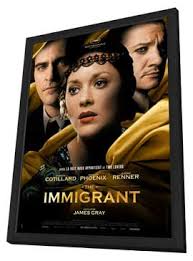
THE IMMIGRANT
US, 2013, 120 minutes, Colour.
Marion Cotillard, Joaquin Phoenix, Jeremy Renner, Dagmara Dominczyk.
Directed by James Gray.
The Immigrant is a grim film.
It is 1921, boats full of migrants sail into in New York Harbour, passing the Statue of Liberty, full of hope, then landing at the migrant centre on Ellis Island, a vast and milling place where apprehensive migrants, many not speaking English or unsure of it, face the officials who grill them on their backgrounds, sometimes threatening, on the lookout for any who have contagious illnesses, eventually passing the greater number of them who then go out into the vastness of the city of New York and its streets, sometimes welcoming, sometimes welcoming.
The two immigrants at the beginning of this story are Polish sisters, Ewa and Magda, who have left their home country in some desperation and are relying on the welcome of an uncle and aunt. The plan does not go well. Magda is suffering from tuberculosis and is quarantined. There have been some accusation against Ewa and her behaviour on the ship and she is held under some suspicion.
This part of the plot is forcefully communicated with Marion Cotillard playing Ewa.
Enter Bruno, played by Joaquin Phoenix. He seems a concerned American, appearing on Ellis Island to help those in need. He chooses Ewa. We are taken in by him initially but it soon appears that he is a rogue, manipulating the authorities, sometimes buying them off, choosing women allegedly to help but actually taking them to his dive of a vaudeville theatre, where they are to perform, where they are to become prostitutes. At first, Ewa is grateful, relying on his attentions, then gradually realising the truth.
The option for Ewa is to be confined on Ellis Island and deported or to go along with Bruno’s plans and get enough money for him to buy off a guard who will release Magda. Ewa makes the option for her sister.
Bruno becomes infatuated with Ewa and falls in love with her. She can accept his help but not his affection. Complication arises when she sees a magician, Emil (Jeremy Renner) performing at Ellis Island and is attracted to him, and he to her. It emerges that he is a cousin to Bruno and that they have clashed for many years. They fight disastrously.
Ewa goes to see her aunt but is rejected by her uncle, later going again to get some financial help. As she collects her money, Bruno becomes somewhat compassionate, not entirely unredeemable.
The film has been directed by James Gray, who has made only a few films but stories of the grimmer side of American life, Little Odessa, The Yards, We Own the Night, Two Lovers. Joaquin Phoenix has appeared in most of his films. Phoenix is a versatile actor and offers an interesting performance here, a complex man of good and evil. The emotional power of the film relies on Marion Cotillard who is a mixture of tenderness, strength and determination, someone who may realise her American dream.
1. An American story? American migration? From Europe? Experiences, hardships, hopes?
2. 1921, costumes and decor, Ellis Island, the vast spaces, corridors, assemblies? New York City, neighbourhoods, poverty? The dives, the shows, prostitution, violence? The musical score?
3. The title, plain, emphatic, Ewa and Magda, their story, self-sacrifice, family and leaving Poland? Degradation? Possibilities?
4. The start, the irony of the Statue of Liberty? Landing, the officials, treatment, questioning? Documents? The careful scrutiny about illness? Quarantine? The possibilities of being deported? The bond between the two sisters? The picture? Ewa and her motives, Magda ill and being taken away?
5. Ewa, the accusation of misconduct? Holding it against her? In the queue, Bruno’s presence, his choice of her, seemingly random, the later revelations of his manipulation and bribes? Ewa, her desperation? The story about her uncle and aunt and their change of address? Ewa and her reaction? Being taken by Bruno, the lodgings, the women, poverty, sleeping 13 hours, waking to a new life?
6. Bruno, his pose, everything arranged, his lodgings, his attraction towards Ewa? His theatre, the woman in charge, the rehearsals? The clients, the reactions of the men? The girls and their performances, prostitutes? Ewa and her being unwilling? Bruno’s hold over her, and need for money, to pay for Magda’s release, her reluctant agreement? His attentions?
7. Ewa, trapped? Visiting her aunt, the severity of her uncle? The later visit to the aunt to get money? The women, her friend, the religious dimension, the church, her talking about her religion and her faith?
8. Going to Ellis Island, the concert, Orlando the magician, his performance? Emil and his attraction to Ewa? His presence at the theatre?
9. Emil, the past, Bruno’s cousin, the history between them? magic and performance? the clash with Bruno, Bruno laying down the law, Emil causing trouble, his being ousted?
10. Bruno and the girls, being dismissed by the owner of the theatre? Central Park, under the bridge, the girls, on display, the men passing by? The young man, choosing Ewa, the meeting with Emil, the bond between the two, Bruno’s discovering them?
11. Bruno and Emil, the clash, Emil’s death? Ewa’s grief?
12. Jealous girl, giving information?
13. Ewa, the arrest, Bruno helping her again, going to Ellis island, the deal for Magda, the official, the money, his allowing Magda to leave with Ewa?
14. Bruno, the complexity of his character, exploiting people but some good nature? The effect on Ewa? Her not wanting to see him again?
15. Ewa, going west with her sister, prospects?
Published in Movie Reviews
Published in
Movie Reviews
Tagged under
Saturday, 18 September 2021 19:52
At Any Price
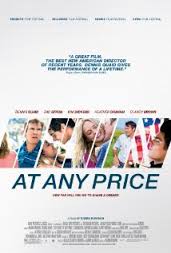
AT ANY PRICE
US, 2012, 105 minutes, Colour.
Dennis Quaid, Zac Efron, Kim Dickens, Red West, Clancy Brown, Maika Monroe, Heather Graham, Chelcie Ross.
Directed by Ramin Bahrani.
This is a film written and directed by Ramin Bahrani, born in North Carolina from an Iranian family background. He made quite some impact at an early age with some short films but features including Chop Shop, Man Push Cart, Goodbye Solo. And he was to further make his mark at festivals with 99 Homes.
This is a particularly American story, the story of family. The father, a touch patriarchal, is played by Dennis Quaid, with Kim Dickens as his faithful wife, while he himself is not particularly faithful, having an affair with a woman in town, played by Heather Graham. He is involved in sales of machinery to farmers, with ups and downs in contracts and his continued need for finance, getting into trouble with rivals who bring in the law which threatens his livelihood and family.
He had wanted his son to enter into the business but the son wants to be a racing driver. He is played by Zac Efron. The final crisis is played out in a way that audiences would not be expecting, the relationship between father and son, violence and cover-up.
This leads to quite a deal of moral ambiguity throughout the film but, especially, in the finale and its repercussions for this. What might have seen quite a straightforward look at an American family in middle America, details of the way of life, and struggles within family, becomes a film of a different complexion.
1. The title? Expectations? Americana, families and traditions, business and success? Characters overreaching themselves? Paying the price?
2. Iowa, the farms in the fields, the roads? Offices, meetings? The racing car world? The cornfields? The songs, the school?
3. The prologue, the movies, the picture over the decades, the family, passing on traditions, hard work in the fields, success? The heritage?
4. The pressure on Henry, the influence of his father, his father’s hard work, expectations? Changes over the years? Different ways of work? Sales of seeds? Genetically Modified Crops? The customers, sales and reps? Henry and his children, hopes? His disappointment with Grant? His relationship with his wife, the comfort of the house, the many years? The reasons for his affair with Meredith? His washing the seeds, reselling them, his friend and the deal, his life and everything about to unravel?
5. Grant, the eldest son, studies, leaving home, going to Argentina, the mountain, climbing it, the clear air – and the postcards, letters? His achievement? Freedom?
6. The contrast with Dean, younger, his skill with cars, racing, awards? With Cadence and the friendship? The bond? Love or not? His antagonism towards his father? Going to the funeral, his father approaching the owner and talking about sales, Dean humiliated? The later recurrence of this theme, the deal, encountering the family who had rented the property and how they had lost their rights? Dean and love for his mother? His friends, the interest in cars, with them? The entry fee for the competition, his mother giving him the cheque, his father finding out? His father trying to support his son? The big drive, his nerves, the injury, the rivalry with Johnson’s son? His moods, changing, the encounter with Meredith, ousting Cadence? His adopting his father’s point of view, supporting his father, the fight with Johnson’s son, in the cornfields, his making assumptions about the critique of his father going to law, killing the boy, ringing his father, disposing of the body? Not telling anyone? the future?
7. Henry and his friend, his wanting a job, the past, washing the seeds and the machine, Henry refusing? The later meeting, the man giving information to the authorities?
8. The issue of washing seeds, rivalry and competition, Henry and his illegal dealings, the officials coming, getting them off his case, their persistence, his wife doing the books, his cooking the books? The discovery of who it was that reported him, going to meetings, memories of the funeral, the man and his wife, destitution, his agreeing to take the deal with Henry and to stay managing the property? Henry saving himself?
9. The Johnsons, the rivalry, sales in different counties, Johnson and his personality, his meeting with customers, the changing allegiance? Henry and his doing the same thing? The two sons and their car rivalry? The fight, the boy’s death? Henry and his double standards in offering consolation to Johnson? Johnson and his grief?
10. The parties with the customers, all cheerful, Dean and his joining his father?
11. The critique of aspects of the American dream?
Published in Movie Reviews
Published in
Movie Reviews
Tagged under
Saturday, 18 September 2021 19:52
Soemthing to Talk About
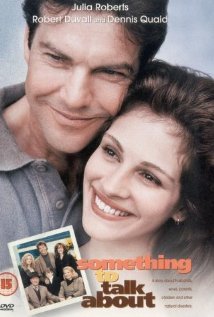
SOMETHING TO TALK ABOUT
US, 1995, 106 minutes, Colour.
Julia Roberts, Dennis Quaid, Robert Duvall, Gena Rowlands, Kyra Sedgwick, Brett Cullen, Muse Watson.
Directed by Lasse Hellstrom.
1. A picture of an American family? Affluent? Success? Problems and solutions?
2. The city, homes, offices, restaurants, workplaces? The contrast with the country, the mansion, the stables? The competition sites? The musical score?
3. The title, generic, for each of the characters?
4. The focus on Grace, her relationship with her husband, her daughter, her parents, her sister? Employees? The interactions with each of them? The background of her story, as a little girl, the two sisters, love for horses, the demanding father, the more passive presence of the mother? Her cooking, the kitchen scenes, professional? The tensions with her husband, seeing him with the other woman, her anger, ousting him, her father and his advice to make up, her mother reticent? Her exasperation? Going out, in pyjamas, with her daughter, seeing her husband and the restaurant, making a scene? The discussions with her sister and her advice? Her daughter, her age, a love for horses, being with the horses? Her father and the clash with the trainer, taking his side? The schools, the decision to meet with her husband, talking, the meal, the possibilities? Going out with the trainer, going back with him, the possibilities of a sexual encounter, his willingness, her decision to leave? The final competition, her father conceding defeat, the trainer’s victory?
5. Eddie, his marriage, his work, love for his wife, his daughter, the affair, in the street with the girl, Grace and making the scene in the restaurant, his being ousted? Having to sort things out, the meeting with Grace, their talk, the meal? Memories? The mutual faults?
6. The young daughter, strong character, support of her mother, and love her father, wanting them together, with the horses, her riding, her skills?
7. Grace’s parents, the years of their marriage, love, his infidelities, the mother being tolerant, the father and his whims, buying horses, employing the trainer, the competition with his old trainer, the rivalry? The mother, the discussions with Grace, Grace’s anger, challenging, taking stronger stances, ousting the father, his sitting on the steps?
8. Grace’s sister, strong character, independent, giving advice, not taking nonsense from her parents?
9. The rival trainer, his going into the competition, Grace’s father, his losing, congratulations to the trainer, the celebration?
10. An optimism that human nature is basically good and that problems can be sorted out?
Published in Movie Reviews
Published in
Movie Reviews
Tagged under
Saturday, 18 September 2021 19:52
Get on the Bus
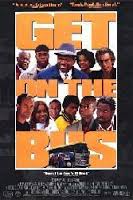
GET ON THE BUS
US, 1996, 120 minutes, Colour.
Richard Belzer, D’aundre Bonds, Andre Braugher, Thomas Jefferson Byrd, Gabriel Casseus, Albert Hall, Hill Harper, Harry Lenix, Bernie Mac, Wendell Pierce, Roger Guenver Smith, Isaiah Washington, Steve White, Ossie Davies, Charles S. Dutton, Randy Quaid.
Directed by Spike Lee.
Get on the Bus is well worth seeing, one of Spike Lee’s very serious “joints”.
Lee would consider himself one of the most significant African- American directors, beginning in the 1980s, making an impact with Do the Right Thing, moving on to political films in the 1990s, especially his portrait of Malcolm X with Denzel Washington. For the next quarter of a century he made all kinds of films, including thrillers like The Inside Man, the The 25th hour and Old Boy.
This film works as a narrative with a wide range of characters as well as using documentary footage about the Million Man March on Washington DC in 1995. Part of the response to the film will be to that of the leader, Louis Farrakhan and his place in that Nation of Islam, his status in the 1990s, his pro-African- American stances, his anti-Semitic utterances and his use of Hitler’s name. There are other speakers in the film including the poet Maya Angelou.
The film was sponsored by significant African- Americans like Will Smith and Wesley Snipes. And there is substantial support from the range of actors who take on the role roles of the men who go on the march, some drama in their backgrounds, the relationships but, especially in the interactions on the bus, the driver moving off, emotional clashes, prejudices amongst the men themselves. This makes the film particularly interesting on a dramatic level.
With stops in various states along the way from California to DC, there are also some interesting reactions from white people and the exhibiting of prejudice.
Veterans like Ossie Davis appear as wisdom-figures along with some of the younger actors, with serious intent or playing like upstarts.
Still worth watching even after some decades.
1. The films of Spike Lee, his perspectives on African- American life in the US? This film in his cannon, a moral plea to African- Americans?
2. The story, The Million Men March 1995, use of the actual footage, including the speeches, Maya Angelou, the crowds?
3. The importance of Louis Farrakhan and the Nation of Islam, his status in the 1990s, patron of the March? His stances, pro-black, anti-Semitic, invoking Hitler? White response to Farrakha? The importance of the discussions about him on the bus, for and against, the importance of the cause despite the status of Farrakhan?
4. The importance of men only? The sequences of the film, especially with the two young women talking about the importance of the sisters in change for African- Americans?
5. The title, the 15 men, the final credits and the 15 significant African-Americans? who contributed to the financing including Will Smith, Wesley Snipes, Robert Guillaume?
6. The film as road movie, on and off the bus? The musical score, the range of songs, their spirit?
7. The locations, California, the Californian countryside, Arkansas, Memphis, Washington DC?
8. The preparation of the trip, Gary and his wife, her concern? Jeremiah, his age? Evan and his son, the court order and the cuffs? George and his organising the trip?
9. The background of white attitudes and the men wanting to go to the March, the friendly approach in Arkansas and the bar, the conversations? The police in Tennessee, assuming drugs, setting the dogs throughout the bus?
10. Racial tolerance? Sexual tolerance? Homophobia? The gay couple, their breaking up, in public, angers? The actor and his homophobic denunciations? Jeremiah and his tolerance? the earnest talk? Going outside the bus and the fight? The reserved gay, his background of being in the military, being shot? The couple remembering their life together? Plans for the future?
11. Xavier, the young photographer, capturing the moments, his discussions with Jeremiah, Jeremiah teaching him to play the drum, the explanation of the drums and messages in Africa? Back on the bus at the end and playing the drum for Jeremiah?
12. The driver, skidding, the phone call, the new driver, his being white? His being uncomfortable, discussion with George, opting out, his own prejudice, but never using the word, nigger?
13. George, guide, talking, enthusiasm, driving the bus, allowing Evan to drive the bus? Discussions about whether Wendell should continue? His discussions with the white driver and the opting out?
14. The actor, his extraverted behaviour, self-centred, explaining his life, discussions with Gary, taunting him about being bi-racial? His talk about sexual activities and his flirting with the girls? The build-up to the fight? His getting the part, the lack of response of the men on the bus?
15. Jeremiah, his memories of 1963 not going to the March to keep his job, the long story about his life, his job, pleading for it, new companies, the takeovers, downsizing, his drinking, losing his wife and daughters? His prayer at the opening of the journey? His explanation about field slaves and house slaves? His intervening? Playing the drum, singing? The rodeo story to the white man in the bar? His final speeches, his collapse, in the hospital, his death? The men staying at the hospital’s to keep vigil?
16. Jamal, his Muslim prayer, his wariness of the homosexual in the toilet, washing his hands? His Baptist background, his mother, his being on the streets, in the gangs, explaining things to Gary, murder? Gary’s response, as a policeman, as human, his father, black, being killed by street gangs? His demand of Jamal that he be arrested or give himself up on return? The background to discussion about Gary’s mother lecturing to correct and the others whipping their ass?
17. Wendell, the car dealer, his bravado, wanting to go, the money, the vote for him to come, cigars, his big car, his pride in education, thinking O.J. Simpson guilty, his stances, the men ousting him? Raising the issue of Republicans and Democrats, the gay man who was a Republican voter?
18. The importance of the discussions, the dialogue raising all the issues about black men in the United States, the past, prejudices, racism, civil rights, the different stances, black men and leadership rather than perceiving themselves as suppressed or victims? The screenplay giving an overall view of issues concerning African-American? men?
19. The march itself, the men not getting there, not hearing the speeches, the death of Jeremiah, George getting back on the bus and the morale-boosting speech about what they had experienced, different when they got home? The future?
Published in Movie Reviews
Published in
Movie Reviews
Tagged under
Saturday, 18 September 2021 19:52
Equalizer, The
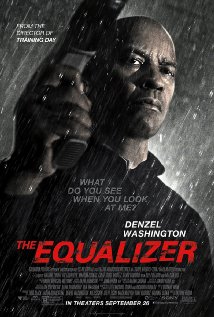
THE EQUALIZER
US, 2014, 132 minutes, Colour.
Denzel Washington, Marton Czokas, Chloe Grace Moretz, Johnny Skourtis, David Harbour, David Meunier, Bill Pullman, Melissa Leo.
Directed by Antoine Fuqua.
The story of a vigilantes saint? The initial emphasis of the film is on the saint, the latter part is on the vigilante, in brutal in his killings but attempting to be rational and moral in his decisions for killing.
Denzel Washington has been appearing in action shows for several years, as he approaches the age of 60. He brings that impression of integrity that he has offered in many of his films. Director Antoine Fuqua directed Washington to an Academy Award in 2001 in Training Day, where, in fact, he was a policeman but the film villain.
This film is loosely based on a television series starring Edward Woodward.
The first impression that Denzel Washington makes is of a benign, serious, loner, sympathetic friend called Robert Mc Call. He lives quietly in an apartment, absolutely neat and orderly at all times. Off he goes to work in a warehouse, sympathetic to many who work there, especially Ralphie, an overweight young man who has ambitions to be a security guard. At night, he can’t sleep and goes over to a nearby diner to read a book, currently The Old Man and the Sea. He chats with and befriends a young girl who is obviously a prostitute (Chloe Grace Moretz). It is in sympathy for her and the treatment she has been given by a group of Russian thugs, especially her pimp, that Robert gets involved in helping her.
Involved is rather meek word for what he actually does. Quietly going to their restaurant, going into the office, checking out the four men who are there, especially the leader who has been brutal to the girl. They laugh at him, he looks at his watch, and within less than a minute they are all dead.
The Russians send their Equalizer or, perhaps better, their Leveller, who uses the local thugs on behalf of the Moscow-based boss, to find out who did the killings, suspecting Irish and Italian groups in the city. A bit of roughing up makes them realise they are not responsible.
Nikolai, the Leveller (Marton Csokas is very persuasive as a sociopathic villain the with a smooth-talking and urbane manner, but otherwise ruthless) actually tracks down, using CCTV footage, this African- American who does not seem at all like someone who executes and with such accuracy and method.
As we probably suspected, Robert was an FBI agent, skilled in killing, but opting out because of his wife and her illness. He goes to visit former agents, good cameos from Melissa Leo and Bill Pullman, gets information about the Leveller. So all we have to do is wait for the final confrontation.
While Robert is still something of a saint in his moral attitudes for wreaking vengeance, the killings themselves become much more brutal, seemingly pandering to a strong appetite for visual violence in the audience. Some of it stretches credibility, but by this stage the film is something of a 21st century Death Wish.
1. 21st century urban action? The city and crime? International gangs, Russians? Police work, honest and corrupt?
2. Robert as a lone avenger? A kind of vigilantes saint? His past, the audience not knowing it for some time, FBI, his work, killing, his love for his wife, her death, his changing – but becoming the Boston Equalizer, a kind of vengeful Robin Hood?
3. The film derived from a television series? Adapted? Hero and villains, the owner, uncompromising, vigilantes, allowing people the opportunity for choice and repentance? action and executions?
4. Audience sympathy for Robert, as a person, his principles, his confrontation of evil, destruction and villains, the edifying loner and worker? In action?
5. The increasing brutality of the executions? Necessary for the plot? Or pandering to audience response to violence? Brutality?
6. Audiences being patient at the start? The introduction to Robert, his very neat house, shaving and dressing, breakfast alone, tidiness, washing up, his meals? Unable to sleep well, walking to the diner in the early hours, reading the books, the hundred books to read before you die, his wife’s example? The new books, The Old Man and the Sea and the discussions with Alina? Alina always at the diner, the young prostitute, dress, her manner, her clients, Salvi as the boss, his ruthlessness, the fat client and the car, her pretending to be friendly? Her being beaten? Robert and his response? His kind words, urging her to be herself, anything she wanted to be, his being her mentor?
7. During the day, his job, on the floor, the practical work, the goods? Friendship with Ralphie, his sandwich, urging him to diet, to be ready for the security job, the exercise and dragging things along the ground? Jenny, nice, repartee in the canteen? The hold-up, giving up her ring? Robert and his quiet and fruitful life?
8. Alina, giving him the CD of her songs, her being bashed, at the hospital, talking with the other prostitute? His decision to go to Salvi’s restaurant, walking in quietly, offering the money for Alina, allowed only a month, Salvi and his spurning Robert, the other gangsters?
9. The gentle talk, the guns, Robert giving himself 60 seconds, his fighting ability, speed, deadliness? Giving Salvi the chance to repent, his refusing, dying?
10. Ralphie leaving work, Robert finding him, fire, his work for his mother, her having to pay protection money, the corrupt cops, the challenge, Robert confronting them, offering the chance to repent? The giving the money back? But the Russians killing them and putting their bodies in the boot of the car?
11. The hold-up, Jenny sad, her ring, Robert calm, getting the number plate? The return of the ring? The confrontation left to the audience imagination?
12. The investigations, the killings, the news on television?
13. The arrival of Nikolai, his being superior to everyone, the American reaction, his putting them down? In himself, the range of henchmen? His responsibility to Pushkin? The encounter with the Irish, the boss answering him back, his brutality and violence? Sending a message to the other groups?
14. Nikolai confronting everyone, no information about who was responsible for the deaths? His ordering everybody to get the surveillance tapes, seeing Robert? His confrontation with Alina’s friend, getting the information from her, killing her?
15. Seeing Robert, at the diner, then visiting his house, pretending to be police, Robert asking him for his card? Robert watching him from the window, going off in the limousine?
16. Robert going back to work, fearless, the baseball game, his happiness for Ralphie and his getting his security guard job?
17. Going to the mansion, visiting his FBI friends, Brian and the welcome, information about his arranged death and funeral, Susan, her going to get the information about Nikolai? Warning him? Saying that Robert had come to ask their permission to pursue Nikolai?
18. The restaurant, Robert present, the thug, the lights going out, killing him?
19. The restaurant with Nikolai, telling him the story of his background, the foundling, in the family with the good father who was compassionate to him all the time, yet Nikolai killing and robbing him? His motivations? The absolute psychopath?
20. Robert cracking down Frank, confronting him in his house, in the car, the carbon monoxide, sitting and watching? The transition to Frank’s leading him to the warehouse, the amount of money, the Asian women counting it? Robert paying off the workers? His confronting the man in charge, the guns, further information, tying them up? The roomful of gangsters bound? Phoning the police, the squad arriving, the arrests?
21. Nikolai and his thugs, taking Ralphie and the others hostage, in the factory? Contacting Robert, the bus, the empty bus, the limit of 30 minutes? Robert arriving, destroying the guards, into the warehouse, the thugs gradually being picked off? The growing brutality of the deaths, barbed wire, screwdriver? His getting the hostages out, putting out the lights, Ralphie charged to put them on again, his coming back, dragging Robert?
22. The final confrontations, alone with Nikolai, the fight, to the death?
23. Meeting Alina, her change of clothes, and a day job, buying the book, her gratitude towards Robert for giving her a new life, her thanks?
24. Robert, resuming his life, his routines? An equalizer – and Robin Hood for the oppressed of Boston?
Published in Movie Reviews
Published in
Movie Reviews
Tagged under
Saturday, 18 September 2021 19:52
Palo Alto
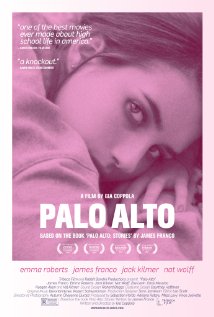
PALO ALTO
US, 2013, 100 minutes, Colour.
Jack Kilmer, Nat Wolff, Val Kilmer, Zoe Levin, Chris Messina.
Directed by Gia Coppola.
This film is based on a novel by James Franco, who, as he grew older, was a student, a writer, photographer, film director, as well as very frequent actor. His novel is based on his experiences of growing up in Palo Alto. Here he plays the coach at the school where the central characters go, makes advances on April, Emma Roberts, a virgin who is torn between Teddy, the nice boy at school, and the coach.
This is a story of young people, in a comfortable society, their participation in education, aspects of sexuality and drugs in their lives, friendships, betrayal.
The two central boys played by Jack Kilmer, a particularly fine performance, sensitive, from this son of Val Kilmer who appears in a cameo role. Nat Wolff is the rowdy young man whose life begins to move into chaos.
A lot of life in Palo Alto is in partying, which has all kind of detrimental effects on the central characters, their futures, their life choices.
The film was adapted and directed by Gia Coppola, the granddaughter of Francis Ford Coppola and Alan or Coppola, the daughter of Gian Carlo Coppola (who died in a boat accident before she was born). This means that she is a cousin of all the other Copploas, Nicolas Cage and the Schwartzmans. Her only other films have been short films
1. A Californian story, about high school teenagers, adults only in the background? The reality of this life? Affluent, worldly, drugs, sexual encounters, psychological states? Hope and despair?
2. The city, homes, school, the meetings of the young, the soccer field, the streets, cafes? Art class? The attention to detail of Palo Alto life? The musical score and songs?
3. The stories by James Franco, his experiences, his perspectives, on young men, on young women? From a writer in his 20s and 30s?
4. The background of short stories, each story in itself, like chapters in a book, episodes put on hold and then returned to, connections?
5. April’s parents, the tough mother, on the phone, preparing breakfast, communicating with her daughter? Her father in the chair, drugs? Teddy, his parents, appearing when he was sentenced to community service? Freddy, Teddy’s visit to his father, and his coming onto him sexually? Freddy’s denial?
6. Introduction to the group, seeing them together, their age, experience, at school, the drugs, the recklessness, especially in driving? Teddy and Freddy, their talking, imagination, comparing their status in society, Freddy crashing the car into the wall? April, the soccer, chat with the other girls, Mr B, their discussions of him, April at home?
7. April’s story, Emma Roberts, age, impressionable, virgin, babysitting for Mr B, her relationship with Michael, the playing games, the adult movie, putting him to bed, the competitiveness of the games? Mr B, his talking with April, kissing, April upset? At soccer practice, his demands, his private declarations of love, yet ignoring April during the practice? Her pleading to him? The sexual encounter, the effect, the aftermath, with her parents? The babysitting, playing the games, Michael demanding cookies, the discovery that there was another babysitter, anger, disillusionment? The soccer game, the loss, her friendship
with Teddy, their not seeing each other, going to the party, their talking together, walking together, sharing? The future?
8. The comparison between April and the other girls, the glamorous style, chat, the sequence in the toilet when she was upset, their superficial style?
9. Emily, with the boys, with April, the discussions whether she was pretty or not, the episode at the pool with Freddy, his pushing her into the pool, her coming out, perhaps coming to her senses?
10. Teddy’s story, age, high school, Freddy as his friend, the discussions? Palo Alto imagination? Carving the heart of the tree, later with Freddy sawing it down? The initial crashing into the wall? His reckless driving, high, his leaving the scene of the accident, the complainants having his numberplate, the police arriving, his arrogant repartee with them? His parents and his being sentenced to community service?
11. The effect of community service, the work and the library, his liking it, reading, the artwork, being helpful? Freddy’s visit, defacing the book? The harsh community service officer, telling Teddy off, transferring him to the elderly? With the elderly, the sketch, the old lady being appreciative and hanging it in her room, her exhorting him to keep his talent, liking the fact of helping people? Improving? Some heart?
12. The art class, Freddy and his painting, the near death experience, the teacher and his parable about near death, the wrong identity, turning around? Freddy remembering this story in his final reckless drive?
13. Teddy at the parties, the sawing down of the tree, Freddy’s knife, Freddy’s erratic driving, talk, Teddy getting out of the car, talk with April, sharing, happy ending and future?
14. Freddy, sexual preoccupation, homophobia, his father, his talk, getting high, the outcast, Emily at the pool, and knife, the threat to Teddy, his final drive, saying he was not Bob and remembering the parable of the art teacher?
15. The lifestyle, California, values and lack of values, possibilities of change and redemption?
Published in Movie Reviews
Published in
Movie Reviews
Tagged under